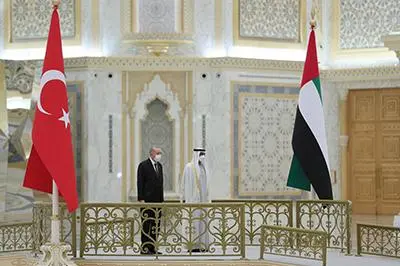PHOTO
It appears that Turkey has taken the right steps toward mending relations with the UAE. Their relations had soured when Ankara started to openly support the Muslim Brotherhood in various Middle Eastern countries.
The UAE politely informed Turkey that it was unhappy with its attitude, but Ankara ignored these warnings. After the failed military coup of 2016, no blame was spared in harshly criticizing the UAE’s rulers. Interior Minister Suleyman Soylu said in plain words that the July 15 plot was carried out upon the instructions of the US and the UAE.
In the Libyan war, Turkey and the UAE fought on opposite sides. The latter also last year participated in a major military exercise organized by Greece, inspiring a chorus of criticisms against the UAE in all sectors of the Turkish public.
In 2020, the US, within the framework of the Abraham Accords, undertook an initiative to normalize relations between Israel and the UAE, Bahrain, Sudan and Morocco. But, for unexplainable reasons, Turkey opposed the Abraham Accords and harshly criticized the plans. It rejected the establishment of diplomatic relations between Israel and the UAE, while at the same time maintaining relations with both. This was a rare example of one country criticizing the establishment of diplomatic relations between two third-party countries.
Ankara also criticized the UAE’s 2018 reopening of its embassy in Damascus. One pro-government social media user, addressing the UAE, wrote: “This quick change came immediately after the US withdrawal from Syria, abandoning the groups that you were financing and after Turkey’s success in Syria,” without specifying what Turkey’s success in Syria was.
All of these criticisms have now subsided and, fortunately, there has been a sea change.
There is now huge potential for cooperation between Turkey and the UAE and it was high time they noticed it. These are two states with moderate tendencies in foreign policy, with the exception of Turkey’s strong bias in favor of the Muslim Brotherhood. Turkey’s ruling Justice and Development Party, known as the AKP, has ideological affinities with the movement.
There are several factors that have facilitated the normalization of relations. Both sides had reached the limit of antagonistic policies against each other before realizing that strained relations did not serve their national interests. The Libyan crisis also acted as a catalyst, as they were fighting for an undefined cause with uncertain outcomes.
The Abraham Accords herald a future that may cause a major change in the Middle East. It is not yet clear to what extent they will be successful, but at least they are likely to create an opportunity to defuse tensions in the region.
Reshaping the Middle East is an ambitious target, but both Turkey and the UAE may contribute to these efforts within their own limits. As the most isolated country in the region, Turkey may use this opportunity to improve its fraught relations with other nations.
Diplomatic improvements often take place when relations are at their lowest level. This is what happened between Turkey and the UAE. Turkey’s unnecessary accusations about the rulers of the UAE will remain in the archives — and hopefully will not be brought out again.
Opposition political parties in Turkey have welcomed the efforts to improve relations, but they did not miss the opportunity to point out the ruling party’s previous rush to use a less-than-polite narrative regarding the UAE’s rulers.
The present thaw between Turkey and the UAE started with a visit to Ankara by Abu Dhabi Crown Prince Sheikh Mohammed bin Zayed Al-Nahyan last November. The crown prince announced that the UAE would create a $10 billion fund to be used in Turkey. This amount may look big, but in the context of Turkey’s huge foreign currency requirements it is negligible.
The UAE is a generous country, but it does not waste its money. It invests after carrying out meticulously screened feasibility studies. Therefore, these funds will most probably be used in areas where both sides will benefit.
Thirteen agreements were signed during the visit, covering several areas, including the defense industry, health, climate change, technology, trade and transportation.
Ali Babacan, a former deputy prime minister and a founding member of the AKP, who has now established his own political party, said that Turkish President Recep Tayyip Erdogan had made a complete reversal in his policy toward the UAE. He has openly questioned why Erdogan would attempt to mend relations with the UAE if Abu Dhabi was behind the 2016 failed military coup. He also queried whether Erdogan would apologize for this accusation. If it is only a question of money, he has to say so openly.
Babacan’s questions will remain unanswered, but Turkey and the UAE will get used to the new reality.
- Yasar Yakis is a former foreign minister of Turkey and founding member of the ruling AK Party. Twitter: @yakis_yasar
Copyright: Arab News © 2022 All rights reserved. Provided by SyndiGate Media Inc. (Syndigate.info).





















